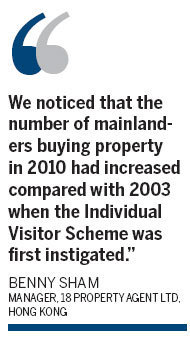Economy
HK attracts luxury spenders
By Oswald Chen (China Daily)
Updated: 2010-06-28 09:35
 |
Large Medium Small |
HONG KONG - Whenever you take a stroll in the flagship stores of luxurious brands such as Louis Vuittion in Central, or the jewelry shops in Mongkok, or even the health and beauty chains of Watsons or Mannings, you will always find mainland visitors on a spending spree.
Everyone is realizing the increasing importance of mainland visitors in the Hong Kong retail market. This is one of the manifestations of the increasing economic interactions between Hong Kong and the mainland.
In a Chow Sang Sang jewelry shop in Mongkok, you can see mainland tourists spending lavishly on gold and diamond. They are impressed by the innovative product design and customer service offered by the jewelry retailer.
A spokeswoman for Chow Sang Sang Group told China Business Weekly that mainland visitors represented an increasing contribution to the Group's business and revenues in 2010.
|
 |
To ensure future business growth, the jewelry retailer is not only targeting mainland tourist custom in the city, it is also eyeing market potential on the mainland. The retailer will invest HK$400 million?to HK$500 million ($51.4 million to $64.3 million) to open more than 50 stores on the mainland by the end of 2010, a spokeswoman told China Business Weekly.
The mainland visitors are not only just shopping for consumer durables, they are also eyeing up financial assets such as stock and property in the city. Some mainland visitors have taken the opportunity to purchase local properties after finishing their regular shopping in the city, a local property agent said.
Benny Sham, manager of 18 Property Agent Ltd, told China Business Weekly that the mainland tourists were each spending HK$6 million to HK$10 million to purchase apartments of 800 to 1,000 square feet for investment purposes.
"Between 2009 and 2010, there were dozens of property deals by mainland visitors executed by 18 Property Agent Ltd. We noticed that the number of mainlanders buying property in 2010 had increased compared with 2003 when the Individual Visitor Scheme (IVS) was first instigated." Shum said.
The spending spree of mainland tourists was sparked by the IVS, which had been approved by the central government. The IVS was one of the vital measures that stimulated the Hong Kong economy when it was hit hard by the Severe Acute Respiratory Syndrome (SARS) disease in 2003. The IVS was part of the Mainland and Hong Kong Closer Economic Partnership Agreement (CEPA) to promote the liberalization of services between the two regions.
CEPA was the first free trade agreement signed between Hong Kong and the mainland. The two parties first agreed the main text of the accord in June 2003 then ratified seven supplements to broaden and enrich its content through continuous and further reciprocal liberalizations.
The Trade and Industry Department of the Hong Kong government recently updated the statistics of the CEPA contribution to the Hong Kong economy since 2003.
| ||||
The CEPA has been successful in job creation for two regions. By the end of 2009, due to the liberalization of trade in services and the IVS under CEPA, 54,700 jobs were created locally, while 40,600 jobs were created on the mainland.
CEPA aims to enhance economic links between Hong Kong and the mainland by strengthening the liberalization of services. Since its inauguration, the total number of liberalized service sectors under CEPA has risen to 44. Cumulative business revenues obtained by companies in the city thanks to CEPA from mainland-related business reached HK$61.6 billion between 2004 and 2009.
CEPA also had a positive impact in attracting mainland investment to Hong Kong after the mainland government in August 2004 streamlined the application procedures for mainland enterprises investing in the Special Administrative Region.



